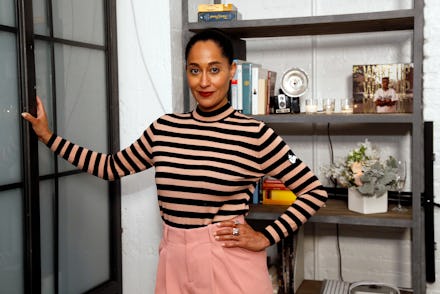'Black-ish' star Tracee Ellis Ross wants all women to thrive in a man's world

When actress Tracee Ellis Ross won the 2017 Golden Globe for best performance by an actress in a television series, musical or comedy, for Black-ish, she became the first black woman since 1982 to receive the award.
In her acceptance speech, Ross said, "This is for all the women, women of color and colorful people whose stories, ideas, thoughts are not always considered worthy and valid and important. But I want you to know that I see you. We see you."
So, how does she succeed as a woman of color in a white man's world? It's all about overcoming obstacles and pain.
At a panel sponsored by Motrin in New York City on Wednesday, Ross and her fellow panelists spoke about the specific challenges faced by women. Ross was joined by New York Times bestselling author Gabby Bernstein, media entrepreneur Ana L. Flores, neuroscientist Tali Sharot and yoga instructor/body positivity advocate Jessamyn Stanley.
Blossoming from failure
Ross kicked off the conversation by urging women to not consider pain "a stopping point."
"I really believe that pain is part of the journey, and often that moment in your journey when you dig deep," said Ross, whose mother is singer Diana Ross. "That's when the beginning of the blossoming happens."
When asked how enduring physical and emotional pain can empower women, Ross explained that it presents an opportunity for reflection.
"Most of my life's most delicious moments or miraculous moments or joyful moments have pain in them," Ross said. "Looking at it as this way to face it and dive deeper."
Ross told a story about how she didn't quit running after learning she had knee problems. Instead, the woman who grew up running track — and, early on in her career, played a track star abused by her coach in a made-for-TV movie — kept running.
"At that point when I started having trouble with my knees, I could've decided 'no more exercising,'" she said. "But instead, it opened up this wealth of different choices to continue moving."
That included dancing, as seen in this tribute video to her mother's 1981 music video, Work That Body:
Ross also cited the importance of the pain of disappointment as an inspiration for growth. Such disappointment might be because "a certain guy didn't call" or something more existential, like "landing at a certain age and going, 'My life doesn't look quite the way I thought it looked or should look.'
"That's an opportunity to look at who I am, what's important to me, what I want more of and what choices I need to make that work for me," Ross said.
Women and perfection
Ross discussed the cultural guilt many women, herself included, feel when they proverbially fall.
"As soon as there's pain, automatically I think, 'Oh God, I shouldn't have done that. What did I do wrong?'" Ross said. "It's interesting to me because I think so much of my life transformed when I switched the gaze from how the world saw me to how I saw the world."
Of course, she admitted she can't always switch gears as quickly as she would like. Too often, society pushes women to strive for perfection or not bother trying at all. For example, a recent Harvard study found women are less likely than men to apply for executive roles if they've previously been rejected.
"We live in a culture where, as women, we are trained to think [that only perfection will do]," Ross said. "If I can focus myself back to how I am experiencing myself and really give myself that space to fall, to try things and not try to be perfect, to actually be more myself — the pain becomes a really interesting and curious part of the journey. I feel like so much of what comes from pain are choices that I never knew were there."
Ross reflected on how hard auditioning once was for her because of the pressure she put on herself — mainly, the pressure to be perfect.
"I was terrified to audition," Ross said. "I felt like I would practice at home and then I would get to the room and then, like, 'Who's that person in there? That is not what I did at home!' And I realized that the magic of the moment was actually the magic of the moment."
That's when she decided to give herself a realistic expectation: take one conscious breath during every audition.
"It didn't matter at what point during the audition. Just one," said Ross. "That was my only goal — not to go get the part, not to go be my best, not to do what I practiced. And slowly without me even realizing it, it turned into the entire experience. If you take a breath, you're present, you're in the moment."
Prior to setting that goal, she said her expectation to audition perfectly would "debilitate" her.
The power of women
Ross brought up the Women's March during the Motrin panel, saying it allowed women to see "the magnitude of our power as women."
"Whether we felt represented there or not, to see the physical size of what we are — both internally and let other people see that externally — I thought was incredibly powerful," she said.
Another reporter's question about how women can live in a man's world prompted Ross to wrap up the conversation with these words:
The same way that women are told to shut our mouths and be pretty — there are many other layers on that — men are told that real boys don't cry. That's not true, either. I think the same ways we should raise our boys to be girls, we should our girls to be boys. We can let all of us have all access and choice to [have] all of the emotions, all of the feelings, any of it.